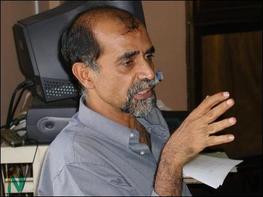Religious bigotry used for political mobilization - Prof.Uyangoda
[TamilNet, Friday, 30 January 2004, 00:15 GMT]
Describing the recent spate of attacks on Catholic churches as "anti-minority terrorism," Professor Jayadeva Uyangoda, Head of the Department of Political Science at Colombo University, in a column that appeared in Friday edition of Daily Mirror, said that "Sinhalese nationalist fringe have seized religious bigotry for [political] mobilization through violence." He accused the PA and UNF for "not taking adequate political action to counter politics of militant Sinhalese nationalism."
Homagama electorate, a township located 20km southeast of Colombo, where Christian population is less than 2% of the Buddhist population (according to 2001 census Buddhists - 189,231, Christians - 3712, Muslims - 1479 Hindus - 962), bore the brunt of recent anti-Christian violence.
Catholic churches in Katuwana, Hokandara, Dik Hetekma and Mattegoda, an evangelical prayer house in Dik Hetekma, Meegoda, and an old Methodist Church in Neboda, near Matugama of the Kalutara district have also been either destroyed or damaged after December 2003.
Prof.Uyangoda points out that the violence was not spontaneous but a result of a two-year build up of a "campaign of hysteria against conversion to Christianity... campaigns that portrayed the Christian minorities as a source of immediate threat to the Buddhists. The uncertainty and tension that prevailed after the sudden death of Rev. Gangodawila Soma Thera has provided these groups a new context and justification for violent action."
"Sri-Lanka's anti-Christian violence has a remarkable resemblance to the anti-minority violence of Hindu Right in India," says Prof.Uyangoda. He notes that using religious sadhus/monks to lead rallies, "mobilizing thousands before moving into action," and creating fear in society with such massive rallies are common strategies employed in both cases.
Characterizing the anti-religious minority violence as a "variant of fascism in the making," Prof.Uyangoda says that there are other "disturbing dimensions" in the anti-Christian violence in Homagama. Involvement of professionals in inciting violence, immunity enjoyed by the perpetrators, police inaction, and the tactic of local police placing the burden on the victims of the"ethno-religious majoritarian" violence, all contributed to the worsening situation, he writes.
Prof.Uyangoda says it is paradoxical that these attacks are happening in an atmosphere of relative peace when "Sri Lankans are trying with great anxiety to emerge out of a violent civil war involving ethnicity." He urges the political leadership to rise to the challenge and institutionalize the normalization, that has occurred due to absence of war, through negotiation and agreement.
Prof.Uyangoda concluded his analysis pointing to the ominous trend in "urban mobilization," where intellectuals in interviews and [in] Sinhalese press "incite Buddhists to violence by arousing their fear and insecurity," and criticizes the political leadership of both the PA and the UNF for "not taking adequate political action to counter this distinctly dark side of the politics of militant Sinhalese nationalism."
He is still optimistic of the future and hopes that Sri Lanka does not move "towards another cycle of violence, like in 1983, unleashed by forces of barbarism who appear to be well-endowed and well-protected."
Prof. Uyangoda is the Head of the Department of Political Science at Colombo University. He was one of the Marxist rebels who led the armed insurrection to capture state power in 1971. He was incarcerated for many years after the rebellion was ruthlessly crushed by Sri Lankan armed forces.











